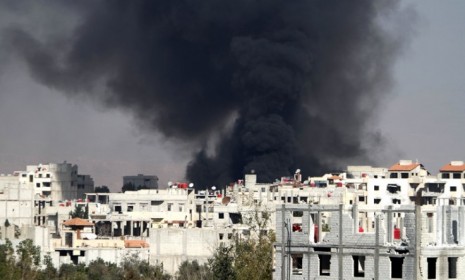Obama's second term: The case for intervening in Syria
Syria is mired in a bloody civil war, and the conflict could spill over into the hot cauldron that is the Middle East

A free daily email with the biggest news stories of the day – and the best features from TheWeek.com
You are now subscribed
Your newsletter sign-up was successful
President Obama faces a whole raft of global messes in his second term, "but perhaps the greatest and most immediate foreign policy crisis... is the civil war in Syria, which threatens to spill into neighboring states," says Elise Labott at CNN. As the deaths and number of refugees mount, "the U.S. has thus far played a limited role," says Josh Gerstein at Politico. "Some who favor more assertive U.S. involvement hope Obama will strengthen his response now that it's less likely to be seen as capitulating to Republican criticism or 'mission creep.'" At the same time, most Americans have little appetite for getting entangled in yet another Middle East war.
The issue: Syria intervention
The uprising against President Bashar al-Assad, and the resulting crackdown from the regime, has turned Syria into the bloodiest of the Arab Spring offshoots, with an estimated 35,000 people killed since March 2011 and more than 100,000 refugees camping out in neighboring Turkey. Things are getting worse — "on average 100 to 150 people now die every day," say Nicholas Watt and Ian Black in Britain's The Guardian, and Britain and Turkey seem to "anticipate a bolder approach from Obama to end the conflict." British Prime Minister David Cameron, touring refugee camps in Turkey on Wednesday, said that "one of the first things I want to talk to Barack about is how we must do more to try and solve this crisis."
The Week
Escape your echo chamber. Get the facts behind the news, plus analysis from multiple perspectives.

Sign up for The Week's Free Newsletters
From our morning news briefing to a weekly Good News Newsletter, get the best of The Week delivered directly to your inbox.
From our morning news briefing to a weekly Good News Newsletter, get the best of The Week delivered directly to your inbox.
The Obama administration has officially taken more of a back-channel role, working to identify and organize effective (and non-jihadist) opposition to Assad. Secretary of State Hillary Clinton recently dismissed the Syrian National Council, a largely ineffective group of exiles, arguing that "there has to be a representation of those who are on the front lines, fighting and dying today to obtain their freedom." But the U.S. is also reportedly helping guide arms to rebel groups through the CIA. If Obama wants to ramp up intervention, he could push for a NATO-enforced no-fly zone, more directly arm the rebels, or even involve the U.S. military in the fight, bombing Assad's remaining military assets.
Why Obama should step up U.S. involvement
Obama's current Syria policy is "starting to look like a lack of leadership," Hussein Ibish, a prominent Arab-American commentator, tells Politico. "People are calling it apathetic and indecisive, which I think is too harsh, but people in the region are getting that impression." From my visits to Syria and Turkey, it seems clear that the current course "will further diminish waning U.S. influence in the Middle East," says Trudy Rubin in the Philadelphia Inquirer. I'm also convinced "that Obama's timid first-term policy on Syria, if continued, will lead to a regional disaster."
"I know Americans are sick of Mideast wars," says Rubin, but Obama can help steer Syria toward becoming a secular country in a way that "doesn't involve U.S. air strikes or putting American boots on the ground." We should be delivering non-military aid to civilians opposed to Assad, but also arm the secular militias left "begging for weapons" while the Islamists are armed by friendly Arab countries. "Only firm Obama backing has any chance of convincing members of the regime, or their Russian backers, that it's time for Assad to go."
A free daily email with the biggest news stories of the day – and the best features from TheWeek.com
The case for staying mostly hands-off
"Contrary to the hopes of interventionists and the fears of many Obama supporters," says Daniel Larison at The Week, the president seems likely to "keep his attention focused primarily on domestic and fiscal concerns," not expending "any political capital on mobilizing support for a more activist Syria policy." Any escalation of either U.S. or NATO involvement could start us on the downward slope to war, and nobody wants that — not NATO, not Syria's neighbors, not Americans, and not our military.
And most importantly, not Obama. In fact, says Larison, "there appears to be a desire in the administration to make the conclusion of prolonged foreign wars part of [its] legacy," so Obama starting a new one is "very unlikely." Indeed, Syria is "unlikely to see any dramatic policy shift" in Obama's second term, says Tony Karon at TIME. "The U.S. and its allies are likely to continue to press for the until-now-elusive goal of creating a single, moderate opposition leadership as a precondition for greater Western assistance. In other words, expect business as usual."
Read more analysis of Obama's second term:
-The case for immigration reform
Sources: CNN, Guardian, Los Angeles Times, New York Times, Philadelphia Inquirer, Politico, TIME, The Week